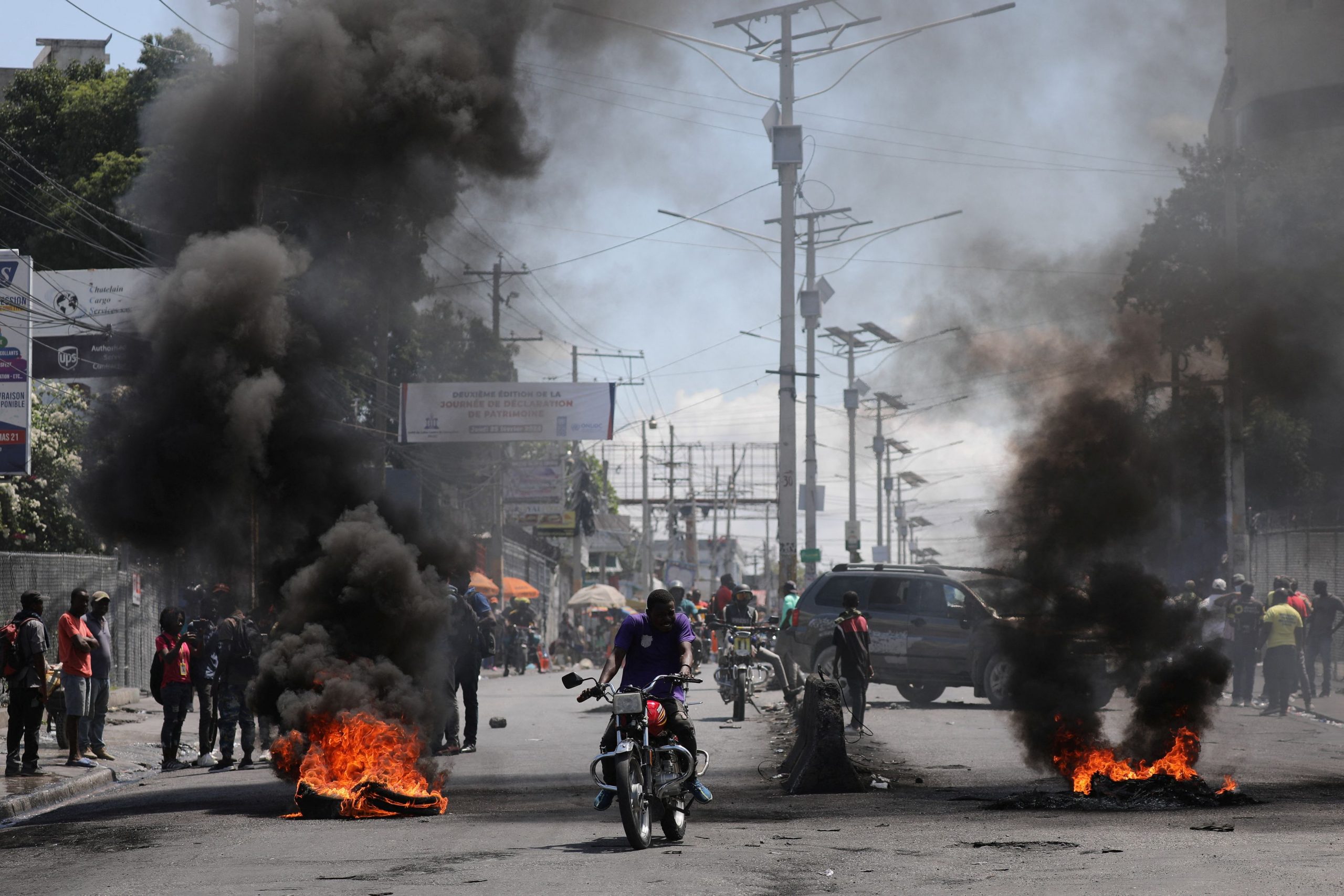Thirty years ago, a U.S.-led multinational force of some 25,000 troops landed in Haiti backed with air support and two aircraft carriers to restore Jean-Bertrand Aristide to power.
“Now we must act,” President Bill Clinton said after the former priest turned politician was overthrown in a coup and violence began to spread.
Today, there is little appetite for a similar rescue mission as Haiti again teeters on the precipice of collapse, just 700 miles from Florida. Large parts of the country are under the control of heavily armed gangs , and its prime minister is stranded in Puerto Rico, unable to return after a trip to secure peacekeepers in Kenya. The U.S. and other Western powers remain focused on the wars in Ukraine and the Middle East.
The U.S. has advised its citizens not to go to Haiti—assuming they could find a way after the airports closed—while urging Ariel Henry , the prime minister, to appoint a transitional council to pave the way for new elections and help bring in international peacekeeping forces.
“The U.S. has been engaged in Haiti really for the better part of the last 100 years or so, and none of those interventions have worked,” said Eduardo Gamarra, a professor at Florida International University who closely follows Haiti. “I think this administration has taken the position of every other administration: that Haiti will always be a problem, that the Haitians in Haiti don’t want us too involved,” Gamarra said, adding that Haiti fatigue is beginning to set in.
Haiti has recently been convulsed by a wave of killings , eight times as many as a decade ago. Kidnappings have skyrocketed, including the abduction of American missionaries, with warlords now controlling about 80% of the capital, Port-au-Prince, adding to the flow of asylum seekers making their way to the U.S. More than 76,000 Haitians showed up at the U.S. southern border during fiscal year 2023, which ended in September, up around 40% from a year earlier, according to U.S. Customs and Border Protection.
In the past week, gang leaders, led in part by Jimmy “Barbecue” Chérizier, have said they are now aiming to remove Henry from power, after freeing thousands of convicts from the country’s prisons. They warn of a civil war if the government attempts to regain control.
“The situation is much worse today than 10 years ago, and it was much worse 10 years ago than it was 10 years before that, and so on,” said Stanislas Wojewodzki, a former economic adviser to Haiti. “We have the Somaliazation of Haiti,” he added, referring to the African nation.
As the situation on the ground deteriorates, the U.S. is in a quandary. It no longer wants to intervene directly, as Clinton did in 1994, yet its attempts to find alternative, diplomatic solutions appear to be hitting dead ends while doing nothing risks a major humanitarian crisis just a short flight from Miami.
“We went from 200 years of the Monroe Doctrine and heavy-handed meddling to leading from behind,” said Wojewodzki, referring to a policy of U.S. involvement in the Caribbean. “I’m not sure any president wants to touch Haiti with a 10-foot pole.”
Ana Rosa Quintana-Lovett, a former staff director for Latin America on the House Foreign Affairs Committee, said that the U.S. tried to nudge various countries into leading a multinational force, from Canada to nations in Latin America and Africa, before Kenya agreed . But Quintana-Lovett, now senior director of policy at the Vandenberg Coalition, a network of foreign-policy scholars, said the Biden administration hasn’t shown it has an articulated plan.
“No one knows exactly what it is,” Quintana-Lovett said. “What exactly is the way out of this?”
On Thursday, U.S. Assistant Secretary of State for Western Hemisphere Affairs Brian Nichols called on other countries to provide support to Haiti. He said the Defense Department was pledging $100 million and providing airlifts, communications and medical support to Haiti.
“We continue calling for broad donor support for the mission especially from the region in the form of funding, personnel and in-kind assistance,” he said in a speech at the Council of the Americas think tank in Washington. “Helping Haiti restore security and democracy, especially at this critical moment, represents a top priority for the administration.”
Haiti, one of the world’s poorest nations, has rarely been a top foreign-policy priority for Washington even though the U.S. has long been involved in the country.
In 1994, while a senator on the Foreign Relations Committee, the future President Biden said the immediate impact of Haiti’s problems on the U.S. was a surge in Haitian migrants and the hit to America’s own reputation.
“If Haiti—a god-awful thing to say—just quietly sunk into the Caribbean, or rose up 300 feet, it wouldn’t matter a whole lot in terms of our interests,” he said on the “Charlie Rose” television show that year. “If the United States of America allows a chaotic circumstance to exist that close to our shore, notwithstanding the fact that it is not going to fundamentally alter our position in the world no matter what happens in Haiti, it does have effects on our ability to generate consensus on much more important issues throughout Latin America.”
A decade later, Aristide fled into exile accompanied by U.S. military personnel as Haiti was on the verge of a civil war. A United Nations peacekeeping mission was dispatched to Haiti, led by Brazil’s military, but was soon mired in scandals. Other soldiers, including Sri Lankan peacekeepers, were accused of sexually exploiting Haitian children. The Brazilian commander in charge of the U.N. mission died by suicide. A devastating earthquake in 2010 accelerated the flow of people out of the country.
Haiti’s most recent descent into chaos began after the 2021 assassination of Haitian President Jovenel Moïse , making it possible for Henry, the prime minister, to take power as the gangs strengthened their hold on the country.
“You can understand that the U.S. and the international community were reluctant to get involved because it looked like the same story repeating itself every 10 years,” said Luis Moreno, a former U.S. deputy chief of mission to Haiti.
“But I think this time was different,” he added. “Those that follow Haiti could tell that the types of things going on were even over the top for Haiti. The gangs were better armed, more sophisticated, more brutal than even in the past.”
Georges Fauriol, a Haiti expert at the U.S. Institute of Peace, said that while the U.S. had backed Henry because there were few other alternatives, it did little to encourage him to prepare for new elections, as proposed by other Caribbean nations.
“It is backfiring,” said Fauriol.
Further fueling the fire, he said, was the U.S.’s release from prison last year of Guy Philippe, the former police commander who overthrew Aristide in 2004 with an army of exiles and who later pleaded guilty in a drug-trafficking case. Philippe returned to Haiti and is now a focal point of the effort to overthrow Henry’s government. Moreno, who served at the U.S. Embassy in Haiti from 2001 to 2004, described the move as a mistake, considering other alleged crimes Philippe could have been charged with.
Many Haitians lay some of the blame for the worsening chaos with Washington and the international community.
“The international community keeps working with those governing the country, who have been implicated in human-rights violations,” Marie Rosy Auguste, a human-rights activist, said by phone from Port-au-Prince. “We want them to stop backing Ariel Henry and his team.”
Monique Clesca, a member of the Montana Group, a group in Haiti that made proposals that, if enacted, would lead to new elections, said: “A lot of this mess is the U.S.’s doing. The meddling continues.
“As Haitians, certainly we have our responsibility for our corrupt, criminal and incompetent leaders,” she added. “But they have been encouraged, enabled and empowered by the U.S. government.”
Write to Juan Forero at juan.forero@wsj.com and Ryan Dubé at ryan.dube@wsj.com



